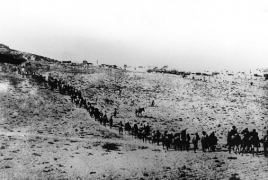You can’t commit genocide without the help of locals: Robert Fisk May 25, 2018 - 11:22 AMT PanARMENIAN.Net - English writer and journalist Robert Fisk has published a fresh article trying to answer the question of how one organizes a successful genocide, be it in Western Armenia a century ago, in in Nazi-occupied Europe in the 1940s, or in the Middle East today. "A remarkable investigation by a young Harvard scholar – focusing on the slaughter of Armenians in a single Turkish Ottoman city 103 years ago – suggests the answer is simple: a genocidal government must have the local support of every branch of respectable society: tax officials, judges, magistrates, junior police officers, clergymen, lawyers, bankers and, most painfully, the neighbours of the victims, Fisk says in the article posted on The Independent. "Umit Kurt’s detailed paper on the slaughter of the Armenians of Antep in southern Turkey in 1915, which appears in the latest edition of the Journal of Genocide Research, concentrates on the dispossession, rape and murder of just 20,000 of the one and a half million Armenian Christians slaughtered by the Ottoman Turks in the first holocaust of the 20th century. It not only details the series of carefully prepared deportations from Antep and the pathetic hopes of those who were temporarily spared – a story tragically familiar to so many stories of the Jewish ghettoes of Eastern Europe – but lists the property and possessions which the city authorities and peasants sought to loot from those they sent to their deaths. "The author, born in modern-day Gaziantep in Turkey – the original Antep – is of Kurdish-Arab origin, and his spare, dry prose makes his 21-page thesis all the more frightening." One of the most powerful of Kurt’s arguments, according to Fisk, is that a central government cannot succeed in exterminating a minority of its people without the support of their fellow citizens: the Ottomans needed the Muslims of Antep to carry out the deportation orders in 1915 – rewarded with the property of those they were helping to liquidate – just as the local people needed the central authority to legitimise what we would today call war crimes. Fisk says Umit Kurt is one of the few academics to recognise the growing economic power of the Ottoman Armenians in the decades before the genocide; “the Muslim community’s envy and resentment,” he writes, “played a central role in the hatemongering atmosphere”. So, too, did repeated Ottoman claims that the Armenians were helping Turkey’s Allied enemies – the same “stab in the back” betrayal routine which Hitler used to rally the Nazis against communists and Jews in the Weimar Republic. In the Middle East today, it is the “infidels” – the “Crusader” (ie pro-Western) Christians – who have been fleeing for their lives for supposedly betraying Islam. "And today, in the Middle East, we know all too well this familiar pattern of local villainy turned against neighbours, Christian girls in Nineveh seized by Islamists, Yazidi families torn apart and their homes looted by local Sunni militias. When Isis fled the town of Hafter, east of Aleppo, I found the documents of the local Isis courts; they proved that Syrian civilians had betrayed their cousins to the Egyptian judges of the Islamist courts, that neighbours had sought financial reward by denouncing those who had lived beside them for decades. In Bosnia in the 1990s, as we know, Serb neighbours slaughtered their Muslim compatriots, raped their women and seized their homes," the writer says. "No, this is not something new – but it is something we too often forget. When my own father was asked by the British government in 1940 to name those in Maidstone, Kent, who might collaborate with the Nazis after an invasion, he put one of his best friends, a local businessman, on his list of those who would assist the Germans. Ethnic cleansing, genocide, mass sectarian atrocities might be directed from Constantinople, Berlin, Belgrade or Mosul. But war criminals need their people to complete their projects or – to use an old German expression – “to help to give the wheel a push”. Authorities said a total of 192 Azerbaijani troops were killed and 511 were wounded during Azerbaijan’s offensive. In 2023, the Azerbaijani government will increase the country’s defense budget by more than 1.1 billion manats ($650 million). The bill, published on Monday, is designed to "eliminate the shortcomings of an unreasonably broad interpretation of the key concept of "compatriot". The earthquake caused a temporary blackout, damaged many buildings and closed a number of rural roads. Partner news |